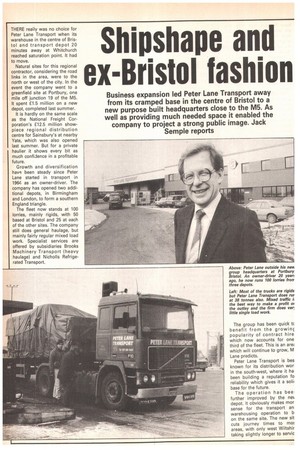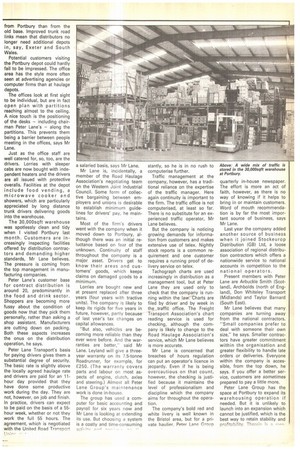Shipshape and ex-Bristol fashion
Page 52

Page 53

If you've noticed an error in this article please click here to report it so we can fix it.
Business expansion led Peter Lane Transport away from its cramped base in the centre of Bristol to a new purpose built headquarters close to the M5. As well as providing much needed space it enabled the company to project a strong public image. Jack Semple reports
THERE really was no choice for Peter Lane Transport when its warehouse in the centre of Bristol and transport depot 20 minutes away at Whitchurch reached saturation point. It had to move.
Natural sites for this regional contractor, considering the road links in the area, were to the north or west of the city. In the event the company went to a greenfield site at Portbury, one mile off junction 19 of the M5. It spent £1.5 million on a new depot, completed last summer.
It is hardly on the same scale as the National Freight Corporation's £12.5 million showpiece regional distribution centre for Sainsbury's at nearby Yate, which was also opened last summer. But for a private haulier it shows every bit as much confidence in a profitable future.
Growth and diversification have been steady since Peter Lane started in transport in 1964 as an owner-driver. The company has opened two additional depots, in Birmingham and London, to form a southern England triangle.
The fleet now stands at 100 lorries, mainly rigids, with 50 based at Bristol and 25 at each of the other sites. The company still does general haulage, but mainly fairly regular mixed load work. Specialist services are offered by subsidiaries Brooks Machinery Transport (heavy haulage) and Nicholls Refrigerated Transport.
The group has been quick tc benefit from the growinc. popularity of contract hire which now accounts for one third of the fleet. This is an are which will continue to grow, M
Lane predicts.
Peter Lane Transport is bes known for its distribution wor in the south-west, where it ha been building a reputation fo reliability which gives it a soli' base for the future.
The operation has bee further improved by the ner depot. It obviously makes mor sense for the transport an warehousing operation to b on the same site. The new sit cuts journey times to mo: areas, with only west Wiltshir taking slightly longer to servic from Portbury than from the old base. Improved trunk road links mean that distributors no longer need additional depots in, say, Exeter and South Wales.
Potential customers visiting the Portbury depot could hardly fail to be impressed. The office area has the style more often seen at advertising agencies or computer firms than at haulage depots.
The offices look at first sight to be individual, but are in fact open plan with partitions reaching almost to the ceiling. A nice touch is the positioning of the desks — including chairman Peter Lane's — along the partitions. This prevents them being a barrier between people meeting in the offices, says Mr Lane.
Just as the office staff are well catered for, so, too, are the drivers. Lorries with sleeper cabs are now bought with independent heaters and the drivers are all issued with protective overalls. Facilities at the depot include food vending, a microwave cooker and showers, which are particularly appreciated by long distance trunk drivers delivering goods into the warehouse.
The 30,000sqft warehouse was spotlessly clean and tidy when I visited Portbury last month. Customers are increasingly inspecting facilities offered by distribution contractors and demanding higher standards, Mr Lane believes. The pressure is coming from the top management in manufacturing companies.
Peter Lane's customer base for contract distribution is around 20, predominantly in the food and drink sector. Shoppers are becoming more fussy about the condition of goods now that they pick them personally, rather than asking a shop assistant, Manufacturers are cutting down on packing. Both these aspects increases the onus on the distribution operation, he says.
Peter Lane Transport's basis for paying drivers gives them a substantial degree of security. The basic rate is slightly above the locally agreed haulage rate and drivers are paid for an 11hour day provided that they have done some productive work during the day. They are not, however, on job and finish. In practice, drivers can expect to be paid on the basis of a 55hour week, whether or not they work the full 55 hours. The agreement, which is negotiated with the United Road Transport a salaried basis, says Mr Lane.
Mr Lane is, incidentally, a member of the Road Haulage Association's negotiating team on the Western Joint Industrial Council. Some form of collective bargaining between employers and unions is desirable to establish minimum guidelines for drivers' pay, he maintains.
Most of the firm's drivers went with the company when it moved down to Portbury, although there was an initial reluctance based on fear of the unknown. Continuity of staff throughout the company is a major asset. Drivers get to know their areas and customers' goods, which keeps claims on damaged goods to a minimum.
Lorries are bought new and at present replaced after three years (four years with tractive units). The company is likely to keep its rigids for five years in future, however, partly because of last year's tax changes on capital allowances.
"But also, vehicles are becoming more reliable than they ever were before. And the warranties are better," said Mr Lane. Leyland will give a threeyear warranty on its 7.5-tonne Roadrunner, for example, for £250. (The warranty covers parts and labour on most aspects of engine, clutch, axles and steering.) Almost all Peter Lane Group's maintenance work is done in-house.
The group has used a computer for basic accounting and payroll for six years now and Mr Lane is looking at extending its use. But choosing a system is a costly and time-consuming stantly, so he is in no rush to computerise further.
Traffic management at the company, however, has a traditional reliance on the expertise of the traffic manager. Here again continuity is important to the firm. The traffic office is not computerised, at least so far. There is no substitute for an experienced traffic operator, Mr Lane believes.
But the company is noticing growing demands for information from customers and makes extensive use of telex. Nightly stock reports is a common requirement and one customer requires a running proof of delivery service on telex.
Tachograph charts are used increasingly in distribution as a management tool, but at Peter Lane they are used only to check that the company is running within the law. Charts are filed by driver and by week in the traffic office. The Freight Transport Association's chart reading service is used for checking, although the company is likely to change to the Road Haulage Association's service, which Mr Lane believes is more accurate.
Mr Lane is concerned that breaches of hours regulation can put an operator's licence in jeopardy. Even if he is being overcautious on that count, however, the checking is justified because it maintains the level of professionalism and discipline which the company aims for throughout the operation.
The company's bold red and white livery is well known in the Bristol area, but for a private haulier PPtrar Lane Grntip quarterly in-house newspaper. The effort is more an act of faith, however, as there is no way of knowing if it helps to bring in or maintain customers. Word of mouth recommendation is by far the most important source of business, says Mr Lane.
Last year the company added another source of business when it joined Stockeurop Distribution (GB) Ltd, a loose association of regional distribution contractors which offers a nationwide service to national accounts in competition to the national operators.
Present members with Peter Lane are Arbuckle Smith (Scotland), Archbolds (north of England), Don Whiteley Transport (Midlands) and Taylor Barnard (South East).
Mr Lane believes that many companies are turning away from the national contractors. "Small companies prefer to deal with someone their own size," he says. Smaller contractors have greater commitment within the organisation and greater flexibility to handle late orders or deliveries. Everyone within the company is accessible, from the top down, he says. If you offer a better service, customers are sometimes prepared to pay a little more.
Peter Lane Group has the space at Portbury to expand its warehousing operation if needed. But it is unlikely to launch into an expansion which cannot be justified, which is the best way to retain stability and profitability. Thereie ;




























































































